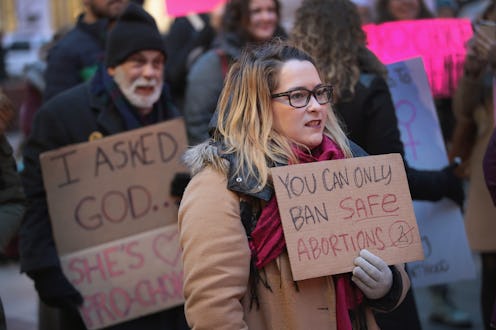
Two anti-abortion bills passed through the Texas State Senate on Monday and will now head to the Texas House of Representatives. These Texas anti-abortion bills impose strict limits on a woman's freedom of choice and quality of care.
The first bill, Senate Bill 415, would prohibit "dilation and evacuation" abortions if it became law. Dilation and evacuation abortions are the most common type of second-trimester abortions and involve dilation of a woman's uterus and removal of pieces of fetal tissue. Anti-abortion activists and supporters of the bill refer to dilation and evacuation abortions as "dismemberment abortions," and refer to the practice as "barbaric." However, abortion rights advocates assert that prohibiting dilation and evacuation abortions could pose a grave threat to women's health. According to the Texas Tribune, banning these types of abortions eliminates the safest way to perform the procedure and could subject women to unnecessary and possibly risky alternate medical procedures.
The second bill, Senate Bill 25, prevents women from suing doctors if the doctor does not tell an expectant mother about serious birth defects before their baby is born. While proponents of the bill claim that it is designed to protect doctors from exorbitant malpractice lawsuits, it essentially also serves as an anti-abortion bill.
To expound, in 1979, the Supreme Court ruled that parents can sue doctors if they are not told about a serious birth defect or disability before their baby's birth that might have resulted in them electing to abort the baby. Senate Bill 25 puts severe limitations on these requirements and disincentivizes doctors from telling patients about fetal abnormalities that would cause their patients to potentially consider an abortion.
It also potentially allows doctors to let their personal feelings on abortion dictate whether or not they choose to tell women about a fetal abnormality.
Senate Bill 25 is a threat to women's (and parents') freedom of choice. If doctors don't inform patients of severe birth defects ahead of the birth of their baby, they are essentially forcing women to give birth to and raise a highly disabled child. Texas State Sen. José Rodríguez, D-El Paso, aptly captured this sentiment via the Texas Tribune, saying the bill "seems to be about restricting and further limiting a woman's right to exercise her choice about what she's going to do in the case of serious defects to the fetus."
These two bills are unfortunately just a part of a series of anti-women's choice legislation that the Texas state legislature has passed in the last few weeks. Earlier this month, the Texas State Senate also passed a bill banning late-term abortions as well as prohibiting women from donating fetal tissue from elective abortions.
Overall, the recent passage of these anti-choice and anti-abortion bills by the Texas state legislature seem to signal that women's rights, lives, and freedom are at stake in Texas. This legislation is an absolute disservice to women; hopefully the Texas House of Representatives will recognize the significant problems with these bills and have the wherewithal to prevent their passage.